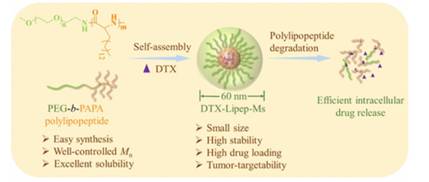Min Qiu†, Jia Ouyang‡, Huanli Sun†, Fenghua Meng†, Ru Cheng†, Jian Zhang†, Liang Cheng†, Qing Lan‡, Chao Deng*†(邓超), and Zhiyuan Zhong*†(钟志远)
† Biomedical Polymers Laboratory, and Jiangsu Key Laboratory of Advanced Functional Polymer Design and Application, College of Chemistry, Chemical Engineering and Materials Science, Soochow University, Suzhou, 215123, China
‡ Department of Neurosurgery, The Second Affiliated Hospital of Soochow University, Suzhou, 215004, China
ACS Appl. Mater. Interfaces, 2017, 9 (33), 27587--27595
Poly(ethylene glycol)-b-polypeptide block copolymer micelles, with excellent safety, are one of the most clinically studied nanocarriers for anticancer drug delivery. Notably, self-assembled nanosystems based on hydrophobic polypeptides showing typically a low drug loading and burst drug release are limited to preclinical studies. Here, we report that poly(ethylene glycol)-b-poly(α-aminopalmitic acid) (PEG-b-PAPA) block copolymer could be easily prepared with tailored Mn through ring-opening polymerization of α-aminopalmitic acid N-carboxyanhydride (APA-NCA). Interestingly, PEG-b-PAPA copolymers exhibited superb solubility in common organic solvents (including CHCl3, CH2Cl2, and THF), while stable nanomicelles were formed in phosphate buffer, with a small size of 59 nm and a low critical micelle concentration of 2.38 mg/L. These polylipopeptide micelles (Lipep-Ms) allowed facile loading of a potent anticancer drug, docetaxel (DTX), likely due to the existence of a strong interaction between the lipophilic drug and polylipopeptide in the core. Notably, cRGD-peptide-functionalized Lipep-Ms (cRGD-Lipep-Ms) were also obtained with similar biophysical characteristics. The in vitro studies showed efficient cellular uptake of DTX-loaded cRGD-Lipep-Ms by B16F10 cells and fast intracellular drug release due to the enzymatic degradation of PAPA blocks in endo/lysosome, leading to a pronounced anticancer effect (IC50 = 0.15 μg DTX equiv/mL). The in vivo therapy studies showed that DTX–cRGD-Lipep-Ms exhibited superior tumor growth inhibition of B16F10 melanoma, improved survival rate, and little side effects as compared to free DTX. These polylipopeptide micelles appear as a promising and robust nanoplatform for anticancer drug delivery.

链接:http://pubs.acs.org/doi/abs/10.1021/acsami.7b10533